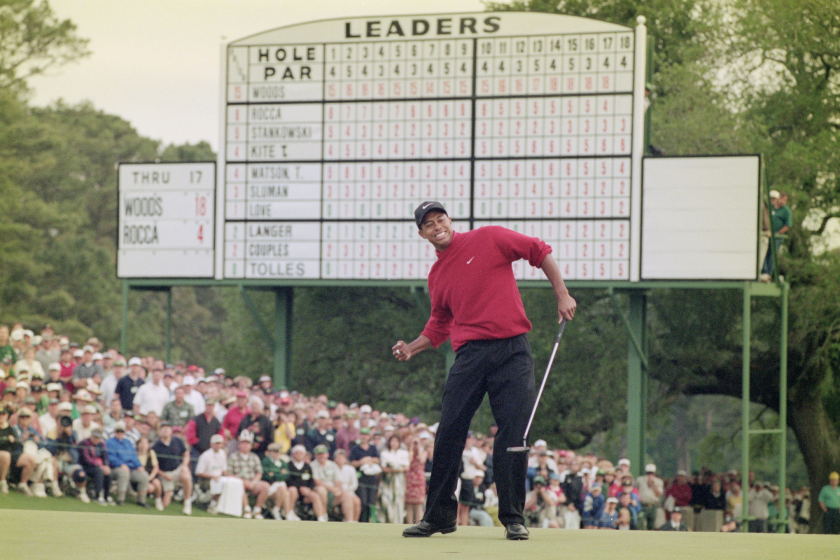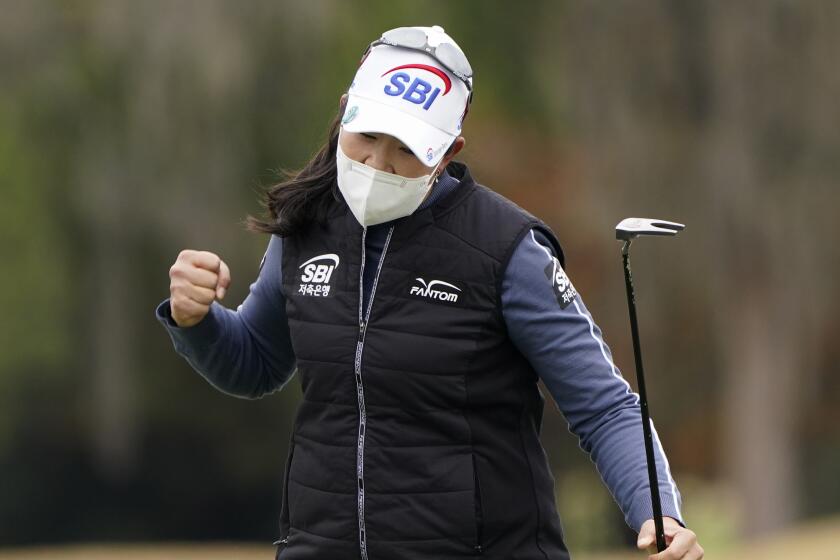15 most fascinating takeaways from HBO’s Tiger Woods documentary ‘Tiger’
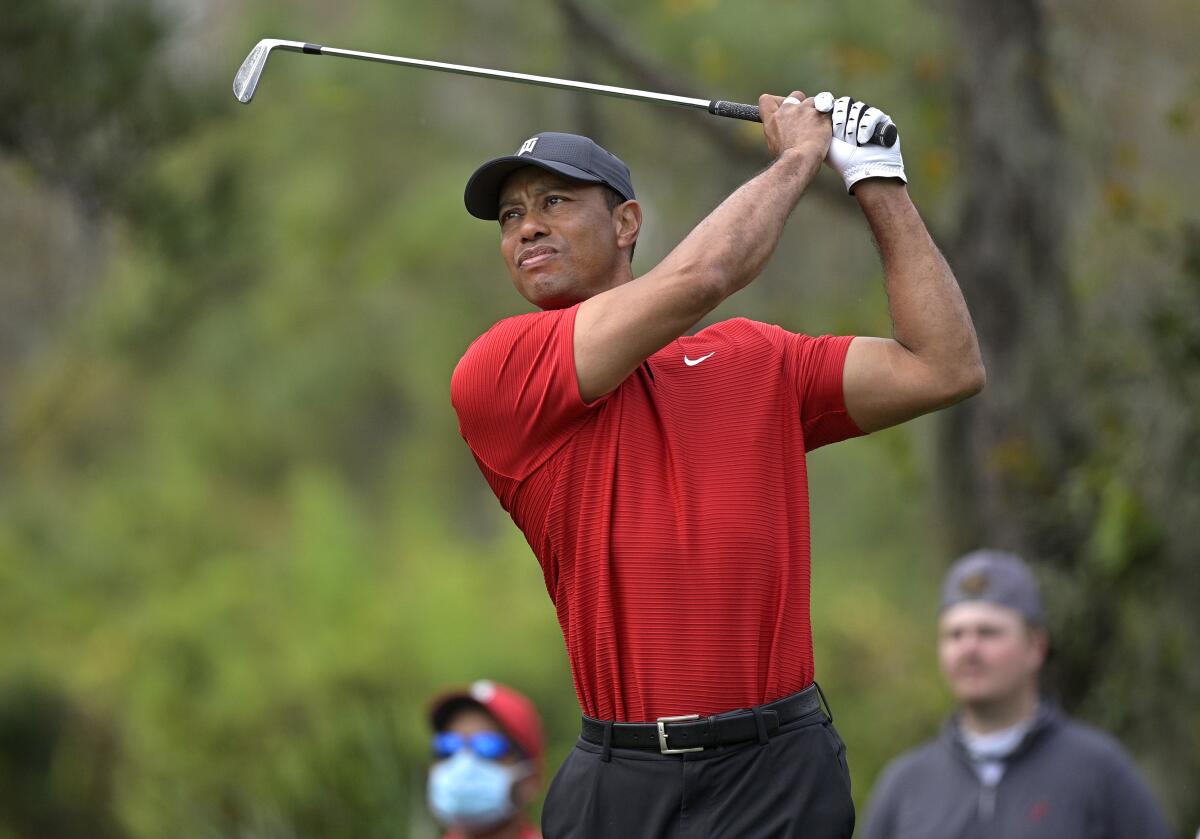
- Share via
The filmmakers of HBO’s new two-part “Tiger” documentary picked an emblematic moment for their opening scene.
It’s a clip of Earl Woods speaking at a 1996 banquet honoring his 20-year-old son, Tiger Woods, as that year’s most outstanding college golfer. Immediately, the duality of their bond was on display.
Earl praises his son, by then already a portrait of fame and success: “Please forgive me, but sometimes I get very emotional when I talk about my son.”
Then, he promises an impossible future in which his child will represent so much more: “He will transcend this game and bring to the world a humanitarianism which has never been known before.”
He proclaims Tiger’s greatness: “The world will be a better place to live in, by virtue of his existence and his presence.”
He pleads for others to see it too: “This is my treasure, please accept it and use it wisely.”
The rest of the episode repeatedly returns to this paternal relationship: Earl Woods loved his son, but was equally enchanted by a grander vision of what Tiger should become.
‘Tiger,’ premiering Sunday, makes clear that the near-cosmic significance attached to Tiger Woods’ talent was, at least in part, a marketing scheme.
Here are 15 other takeaways from the first part of the documentary about golf’s now notorious 15-time major champion:
1. By age 2, a pure-swinging Tiger was already making national television appearances as a child prodigy. How did Earl teach his toddler to become so good? “He would work with him from the green back,” said Pete McDaniel, a family friend who was a co-author of a 1997 book titled “Training a Tiger” with Earl. “That was the secret to how Earl instructed Tiger.”
2. Tiger’s mother, Kultida, was crucial in his childhood training, too, a strict parent who shaped much of his cut-throat competitiveness. McDaniel’s description of the philosophy she imparted to Tiger: “Put your foot on their throat, son, you kill them.”
3. It was clear to those around the Woods family that Tiger’s parents were interested only in letting him play golf. Even Tiger’s kindergarten teacher recalled being shot down by Earl when suggesting Tiger try other sports. “[Other teachers] said he was a pain in the ass, and I agreed with them,” the teacher, Maureen Decker, said of Earl. “He was a definite SOB.”
4. Tiger was a big deal in sports by the time he was 18. An indication: When he won his first of three U.S. Amateurs in 1994, the tournament was broadcast by ESPN and hosted by legendary commentator Brent Musburger.
Another memorable visual from that event: Tiger’s final-round outfit of navy shorts, a striped peach-colored shirt and a straw hat. By the next year, he’d adopted his iconic red-and-black Sunday look.

5. Tiger was always aware of his influential role as a golfer of color. As a pimple-faced kid, he said, “Since I’m Black, I might be even bigger than Jack Nicklaus.” His first Nike commercial included the line, “There are still courses in the United States that I am not allowed to play because of the color of my skin.” And weeks after receiving racist threats while winning the 1997 Masters, he went on the “Oprah Winfrey Show” — where he described his race as “Cablinasian” — and said, “Golf needed to be shaken up.”
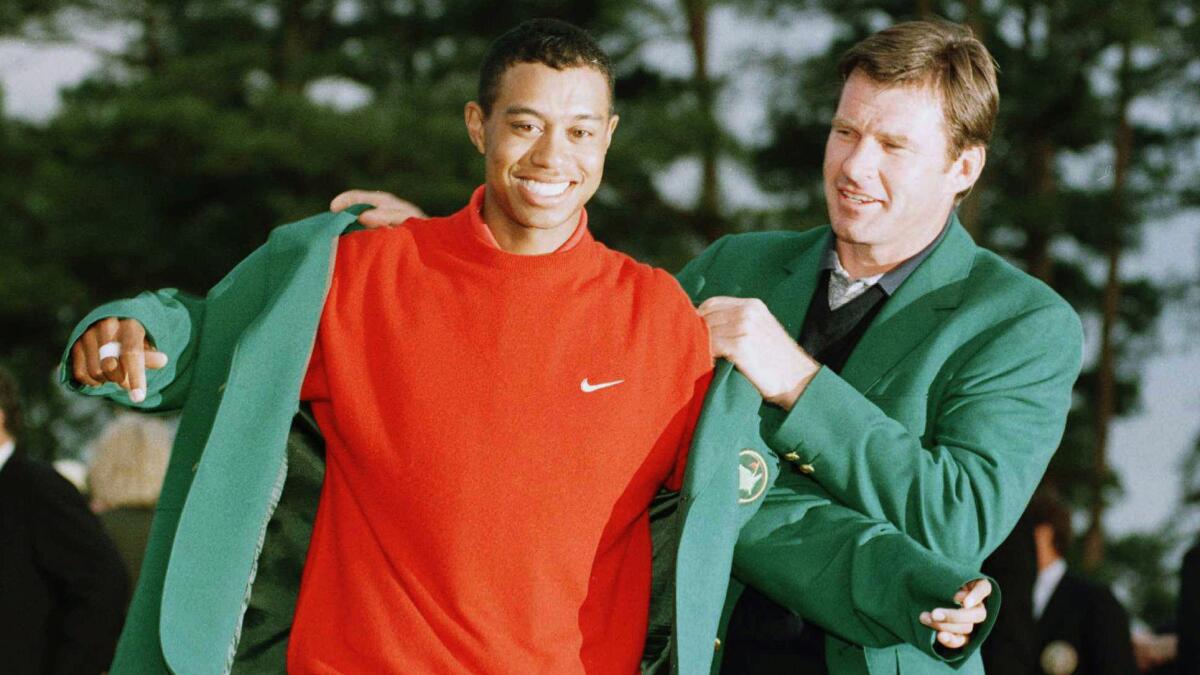
6. Tiger never shared the same vision as his father, who Sports Illustrated reporter Gary Smith said “was adamant Tiger was going to be this incredible bridge between all the different races and tribes of humanity.”
During one interview a reporter asked Tiger: “Your dad thinks that you’re going to be the most important man that ever lived, more so than Gandhi and Jesus.” His response, with a nervous chuckle: “I think that’s just a dad speaking, a proud father.”
“Your dad thinks that you’re going to be the most important man that ever lived, more so than Gandhi and Jesus.”
7. In high school, Tiger’s fame wasn’t yet all-consuming. His first girlfriend, Dina Parr, “didn’t even know we had a golfing team at the school.” The first time she saw him play, “People were asking for his autograph. I’m like, ‘Who would want your autograph? What are you talking about?’ He knew that the fame was not normal.”
8. One of the documentary’s greatest gems: A teenage Tiger, with his top shirt buttons undone and squiggly hairs drawn with a marker on his chest, dancing around during a high school party at Parr’s house. “He knew he could be himself and there was no judgment, no pressure, to live up to these expectations,” Parr said.
Woods’ parents, however, always viewed Parr — and most other things, really, outside of golf — as an intolerable distraction for their son. One time in college, when Tiger lied to them about spending the night at her house, “Tida and Earl, they were furious,” said family friend Joe Grohman.
Not long after, Parr received a letter from Tiger. It began, “Dina, the reason for writing this letter is to inform you my parents and myself never want to talk or hear from you again.” The last sentence: “I know this is sudden and a surprise, but it is in my opinion much warranted. Sincerely, Tiger.”
“Dina, the reason for writing this letter is to inform you my parents and myself never want to talk or hear from you again. . . Sincerely, Tiger.”
9. Despite the tension in his personal life, Tiger’s professional ambition was always clear. “Ultimately, to be the best,” he said during an interview with television host Larry King.
“You want to be known as the best to have ever played this game?” King followed up. “Yeah,” Tiger answered. “Exactly.”
A stark example: He once made his caddy Steve Williams pull over on a highway in Toronto so he could get out and practice a swing idea. “He couldn’t wait till the next day or till he got back to the hotel or wherever,” Williams said. “No one would do that. Just nobody.”
10. Earl tried toughening up his son with mind games during practice rounds: He’d jingle change and talk in Tiger’s back swing, interfere with his putting stroke, walk on his line. A psychologist friend of Earl’s from the Navy taught Tiger self-hypnosis, too.
But nothing could prepare Tiger for the fame of his career. “I guess there’s one thing I really do miss,” he once said. “A sense of privacy.” For example, he took up scuba diving. “That to me was odd,” said friend Amber Lauria. But then Tiger explained to her it’s appeal: “The fishies don’t know who I am down there.”
11. Even at the height of Tiger’s dominance, when he won all four majors consecutively between 2000 and 2001, “there was never really any big celebrations,” Williams said. “Soon as that tournament was over, the thought was to the next major championship.”
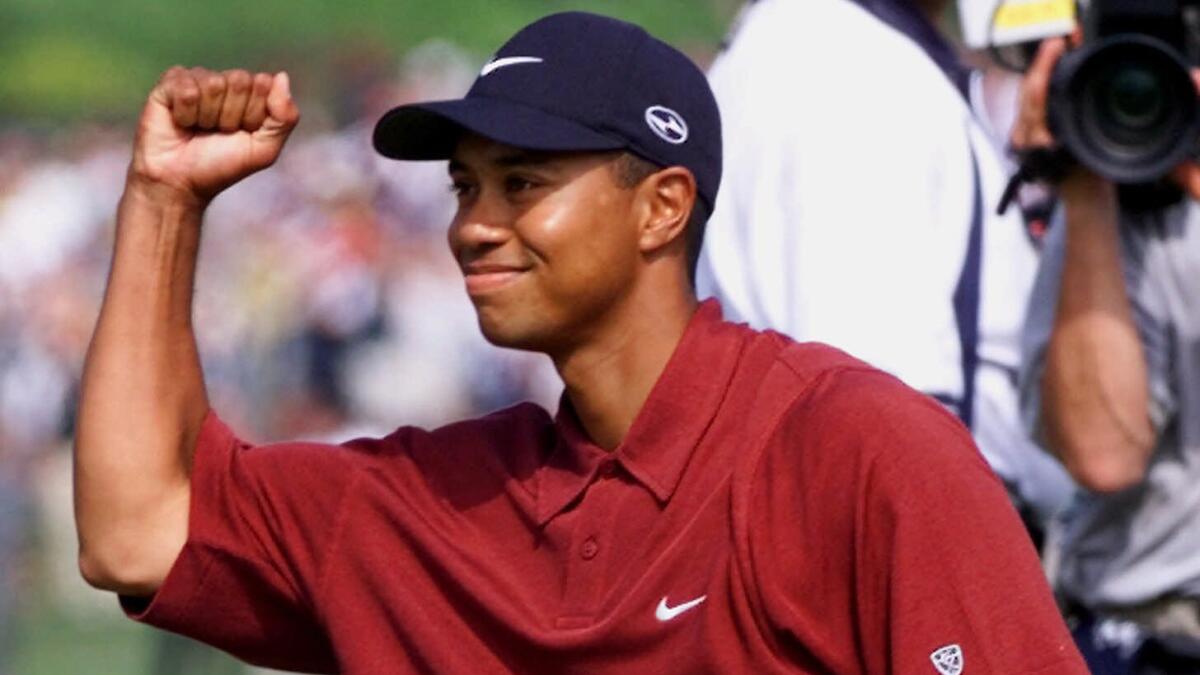
12. As Tiger outdueled rival Phil Mickelson during the final round of the 2001 Masters to complete the so-called Tiger Slam, he successfully outdrove Mickelson on one hole with a 3-wood. Then he rubbed it in, as Williams recalled: “Phil says to Tiger, ‘Do you always hit your 3-wood that long?’ And Tiger says, ‘No. Normally further than that.’”
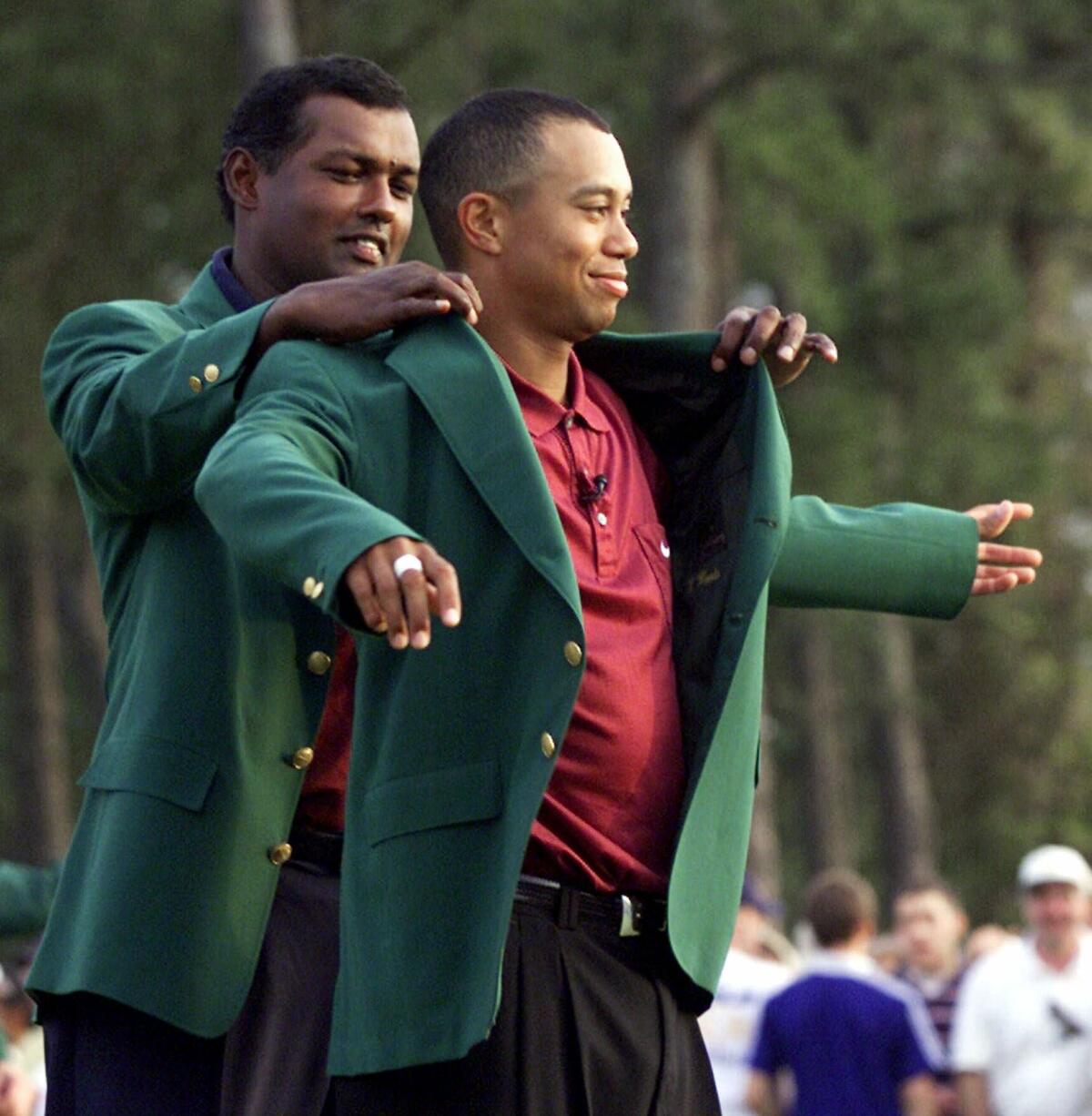
13. According to Grohman and Parr, Tiger was well aware of his father’s extramarital affairs. Parr remembered one time when Tiger called her while traveling with his dad for a tournament, bawling over the situation. “Any child having to witness that, it’s just not right,” she said. “It made a huge impact on his life.”
14. The first time Tiger asked out his future wife, Elin Nordegren, “I think she turned him down at first,” said friend Sandra Sobieraj Westfall, explaining Nordegren’s initial hesitation over his stratospheric fame. But eventually they did begin dating and were married in Barbados in 2004.
“Tiger was sweetly protective of Elin,” Westfall said. “Ironically, the spotlight that first repelled her, suddenly bonded them. Sort of, ‘Us against the world.’ It was just the two of them and she believed it was everything.”
A Lim Kim ties the record for the biggest final-round comeback in U.S. Women’s Open history, finishing with three birdies to claim victory.
15. Two months after Earl’s death in April 2006, Tiger won the British Open. During the tournament, he described feeling “this overwhelming sense of calm. It was like, ‘Hey, my papa’s there.’” After making the winning putt, he shared a long, tearful embrace with Williams on the green.
“Earl provided a lot of self-confidence to Tiger,” Williams said. “With Earl passing, now he had to rely on himself.”
More to Read
Go beyond the scoreboard
Get the latest on L.A.'s teams in the daily Sports Report newsletter.
You may occasionally receive promotional content from the Los Angeles Times.

